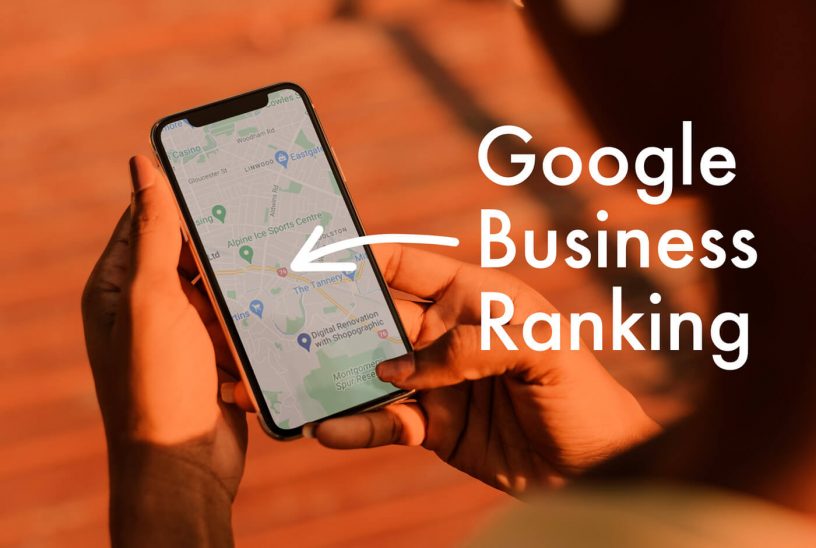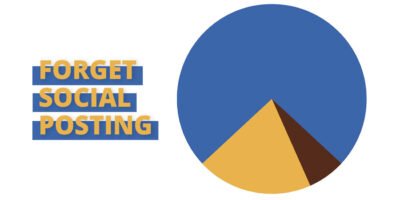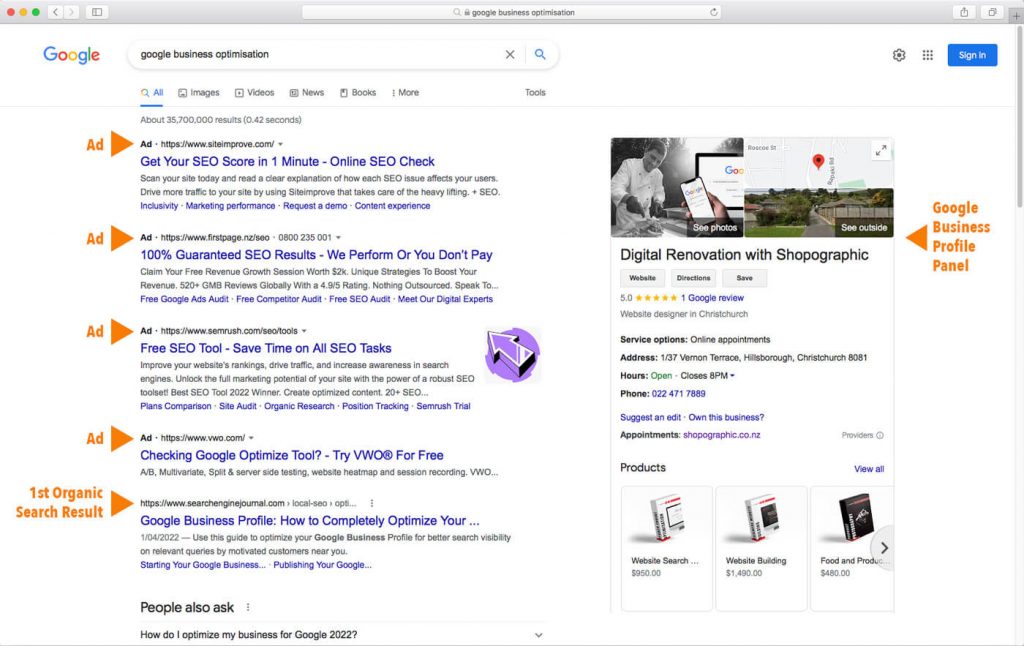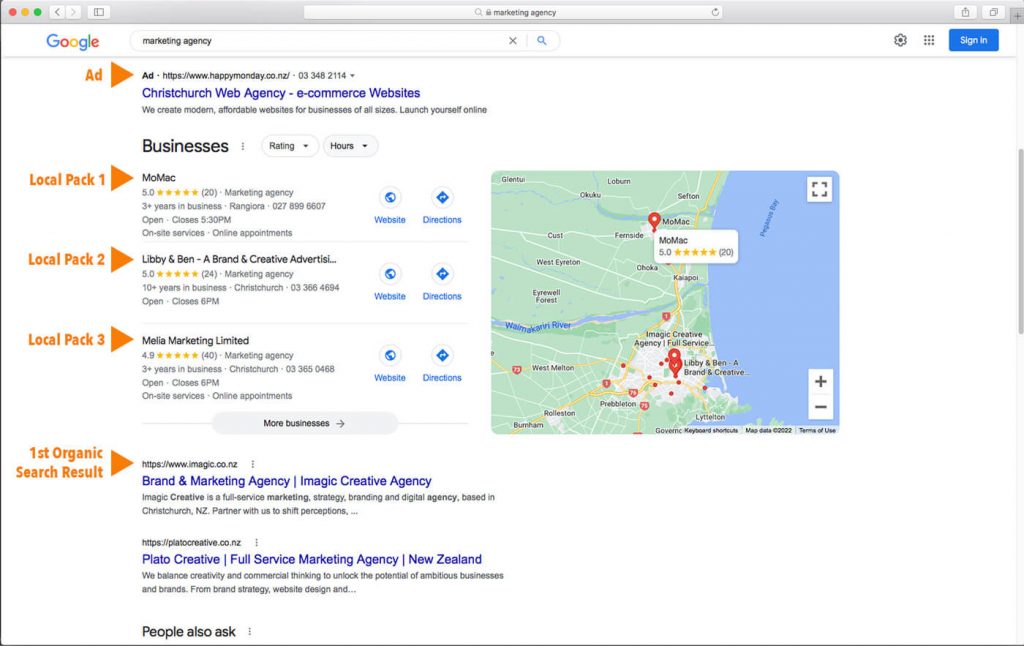Did you know? Your business shows up differently with its Google Business Profile whenever someone searches online for products or services similar to yours.
Your GB Profile can appear in Google Maps, the Local Pack, in desktop- or mobile search results. To ensure your business will show up in these, it needs Local Marketing.
Yeah, ok. – You might say… but
What is Local Marketing?
Local marketing is the strategy businesses use to market to a nearby audience to get their products or services in front of people in their local area. The aim of Local Marketing is to engage new and potential customers within a specified radius with the intention of
- Creating awareness about the business and
- Staying top of mind, turning “followers” into buyers.
Local marketing is typically used by businesses with a physical storefront in their community (such as hotels, restaurants, cafes, bars, offices etc.).
The best tool for Local Marketing is a Google Business Profile. Your Local Marketing results will skyrocket when you do your GB game well.
Can you relate to these statements?
- You are a local business.
- You want to improve your Local Marketing.
- And you want to generate more revenue by driving more eyeballs to your business.
Is that you?
If so, I want to help you understand the different areas where you can rank.
I want you to learn how you can rank and how you could work on optimising these areas to help with ranking. Why?
Because if you want to do your marketing effectively, you need to understand your marketing objectives – in this case, where and how to rank.
I will share the three areas you want to rank with your Local Marketing activities.
If the expression “ranking” is unclear, I will explain.
What is ranking mean in SEO?
When someone searches for anything in Google and hits enter, the search results page will pop up. In most cases, depending on the specific search query that was typed in, visitors will see a page with:
- Google paid Ads results on top.
- Google Map with Local Pack Result.
- Google Business Profile panel.
- Organic Results 10 pcs.
- More Google paid Ads on the bottom.
- Google Search suggestions based on the current search query.
- You could also see FAQs and Videos links among the above.
In terms of a website:
“ranking” refers to a website’s position on the search engine results page (SERP – in short) in the organic results.
In terms of a Google Business Profile:
“ranking” can refer to a GB profile’s presence on the search engine results page or in the Local Pack.
Various ranking factors influence whether a website or a Google Business Profile appears higher on the search engine results page. These factors are based on the content relevance to the search term.
Google states this on its page.
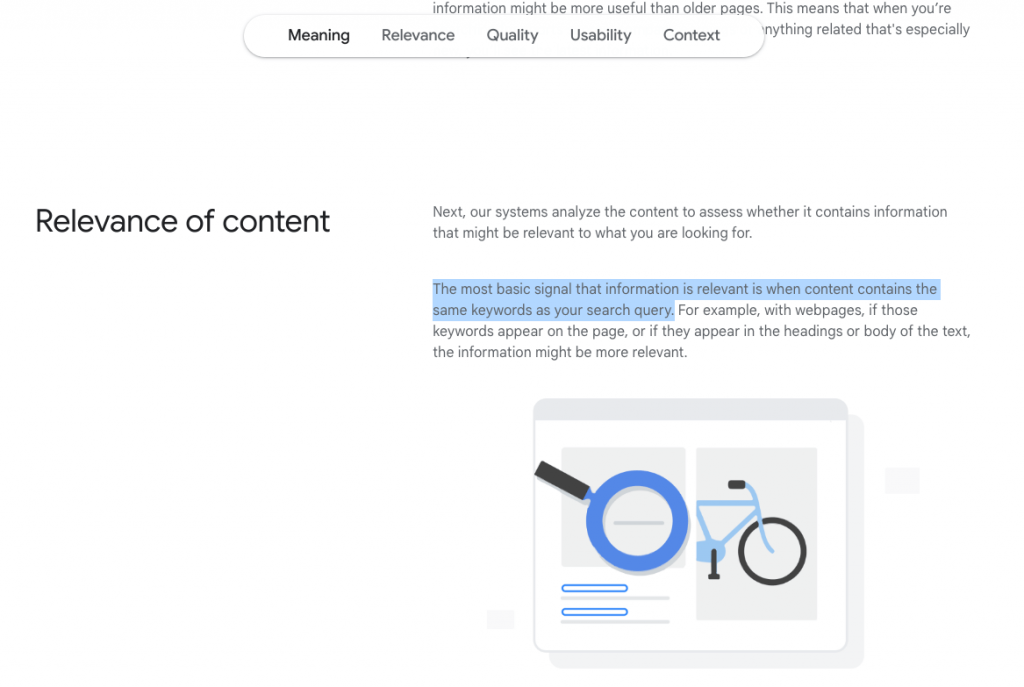
The most basic signal that information is relevant is when content contains the same keywords as your search query.
For example, with webpages, if those keywords appear on the page or if they appear in the headings or body of the text, the information might be more relevant.
Let’s get to the point now that we are clear about ranking.
Here are the three areas in local search results where you want to rank with your Local Marketing activities.
- Google Maps
- Local Pack
- Organic Search Results
According to Google's documentation, the three main local ranking factors are:
Relevance — how much your business matches the user's query.
Distance — how close you are to the search user.
Prominence — how well-known and well-liked the business is.
1 – Ranking in Google Maps means:
You show up for specific terms within Google Maps when someone searches online for products or services similar to yours.
Separate rankings apply on desktop or on mobile.
2 – Ranking in Local Pack means:
Local Pack is the listing of three businesses you see first in the search results (image slide above). Your business can show up for specific search queries as a suggestion from Google. Typically Local Pack suggestions pop up when they use terms with keywords like ‘near me’ or location name in the search query. You will see three Google Business Profile listings in the Local Pack.
Separate rankings apply on desktop or on mobile.
3 – Ranking in Organic Search Results means:
You show up for specific terms within the Organic Search Results when someone searches online for products or services similar to yours. These unpaid listings appear on a search engine results page – the closer to the top (e.g., the first page), the better.
Separate rankings apply on desktop or on mobile.
How to show up in local search results?
In this post, we read about all the critical areas we want to rank with our business.
A natural question arises:
How to rank?
First, check out my comprehensive, free, no-email-needed checklist!!
Google Business Profile Optimisation - FREE Checklist
I have compiled a comprehensive checklist with my tips that you can download for free today.
- It is a simple step-by-step guide.
- You will optimise your Google Business Profile with it.
- You will also improve your SEO.
- All that in a few hours by going through my checklist.
I explain what you are getting in a 2 minute video on the page linked below.
Free to download, NO email address in exchange needed.
Click here to read more or watch the video.
In this article, I have explained how to increase organic traffic on a website? None of the following points is made with paid ads. That means, these are free.
- You need to optimise your Google Business Profile to rank in Google Maps.
- You need to optimise your Google Business Profile to rank in the Local Pack.
- To rank in Organic Search Results, you need to optimise your Website. For that, you need SEO.
There are a few factors Google recently has introduced that ensure you only rank under specific conditions.
Google has introduced features like “Proximity Locks,” limiting the visibility radius, making local SEO even more crucial for ranking in specific areas.
The Impact of Opening Hours on Ranking
Google’s other latest updates now prioritise businesses that are currently open. If your business is closed at the time of the search, your visibility in the Local Pack and Google Maps may be lower than when you’re open. Keeping your Google Business Profile updated with accurate hours, including holidays and special events, is crucial.
If you want to learn more about the basics of SEO, it is explained most simply in this article.
Follow this blog as I share hands-on marketing tips with readers that I find helpful.
Thank you for reading my post.
I am Shopi.
I provide no B.S. marketing & design for Hospitality Businesses.
Original Image by rawpixel.com on Freepik. Modified by me.
